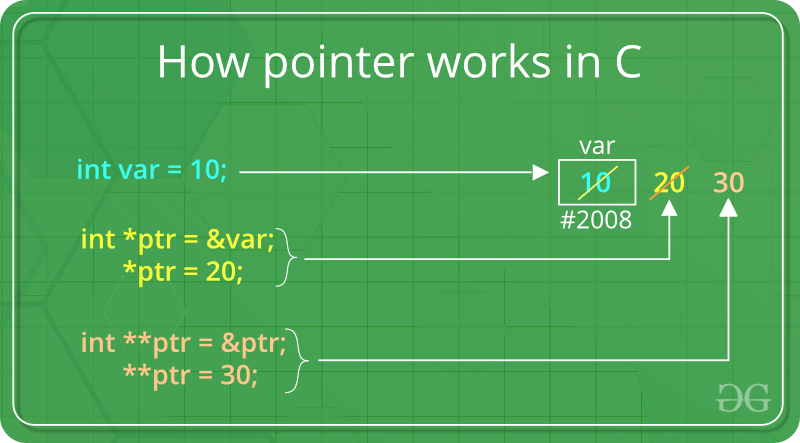Features and Use of Pointers in C/C++
Last Updated :
23 Jun, 2023
Pointers store the address of variables or a memory location.
Syntax:
datatype *var_name;
Example: pointer “ptr” holds the address of an integer variable or holds the address of memory whose value(s) can be accessed as integer values through “ptr”
int *ptr;
 Features of Pointers:
Features of Pointers:
- Pointers save memory space.
- Execution time with pointers is faster because data are manipulated with the address, that is, direct access to memory location.
- Memory is accessed efficiently with the pointers. The pointer assigns and releases the memory as well. Hence it can be said the Memory of pointers is dynamically allocated.
- Pointers are used with data structures. They are useful for representing two-dimensional and multi-dimensional arrays.
- An array, of any type, can be accessed with the help of pointers, without considering its subscript range.
- Pointers are used for file handling.
- Pointers are used to allocate memory dynamically.
- In C++, a pointer declared to a base class could access the object of a derived class. However, a pointer to a derived class cannot access the object of a base class.
Uses of pointers:
- To pass arguments by reference
- For accessing array elements
- To return multiple values
- Dynamic memory allocation
- To implement data structures
- To do system-level programming where memory addresses are useful
Drawbacks of Pointers:
- If pointers are pointed to some incorrect location then it may end up reading a wrong value.
- Erroneous input always leads to an erroneous output
- Segmentation fault can occur due to uninitialized pointer.
- Pointers are slower than normal variable
- It requires one additional dereferences step
- If we forgot to deallocate a memory then it will lead to a memory leak.
Share your thoughts in the comments
Please Login to comment...